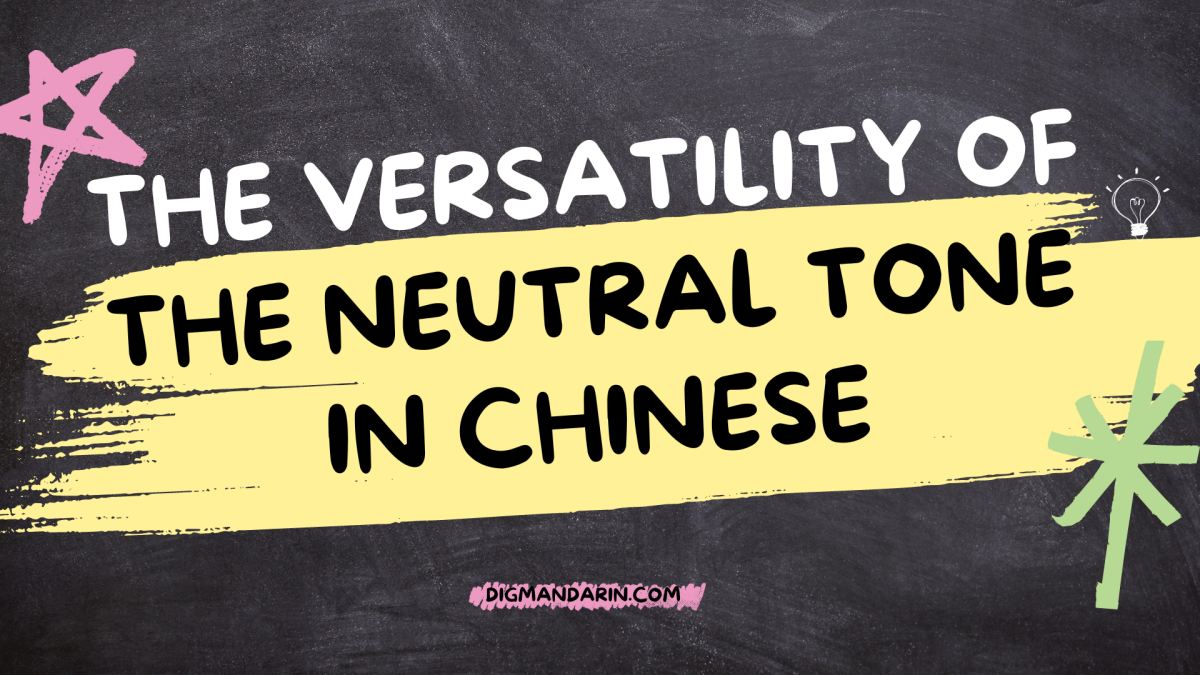The neutral tone, also known as the fifth tone, is a key feature of the Chinese language. Unlike the four main tones, the neutral tone is light and unstressed, often used to convey subtlety and natural speech flow.
The neutral tone can change the meaning and function of words, making it crucial for proper communication. It plays multiple roles in the language, enhancing its rhythm and pronunciation.
For instance, in grammatical particles, it appears in words like 吗 (ma) for yes/no questions and 吧 (ba) for polite requests. Auxiliary words like 着 (zhe) for ongoing actions and 了 (le) for completed actions also use this tone. Nominal suffixes such as 子 (zi) and 们 (men) form new words or indicate plurality. Reduplicated words, where the second part is in a neutral tone, are common in everyday language, like 谢谢 (xièxie) for thank you. Understanding these roles helps in grasping the subtleties of Chinese grammar and pronunciation.
Get to know the full picture of the Chinese Tones.
Neutral Tone As Chinese Grammar Particles
Particles in Chinese are words used to indicate various grammatical functions or convey nuances in speech. Some common particles often pair with the neutral tone, including the following:
吗 (ma)
is used for yes or no questions. For example:
你好吗? (Nǐ hǎo ma?) How do you do?
这是他的电脑吗?(Zhè shì tā de diànnǎo ma?) Is this his computer?
吧 (ba)
indicates a polite request or softens a command. For example:
我们一起坐吧!(Wǒmen yìqǐ zuò ba!) Let’s sit together!
快睡吧!(Kuài shuì ba!) Go to sleep soon!
呢 (ne)
is used to form questions about actions, situations, and conditions. For example:
我觉得这里的菜不错,你呢?(Wǒ juéde zhèlǐ de cài búcuò, nǐ ne?) I think the food here is good. How about you?
你在做什么呢? (Nǐ zài zuò shénme ne?) What are you doing?
Learn more about Chinese particles here.
Neutral Tone As Auxiliary Words
Auxiliary words in Chinese are frequently employed alongside verbs, adjectives, or adverbs to convey an action’s status, describe the overall situation, or alter the sentence’s meaning. Many of these auxiliary words are pronounced with a neutral tone.
着 (zhe)
indicates an ongoing action or state when placed after a verb. For instance:
他们坐着上课。(Tāmen zuòzhe shàng kè.) They are sitting and attending class.
躺着玩手机对眼睛不好。(Tǎngzhe wán shǒujī duì yǎnjīng bù hǎo.) Lying down and using a mobile phone is not good for your eyes.
了 (le)
denotes completed actions or changes in a situation. For example:
我吃饭了。 (Wǒ chīfàn le.) I have eaten.
他刚喝了很多果汁,现在不想喝了。(Tā gāng hē le hěn duō guǒzhī, xiànzài bù xiǎng hē le.) He just drank a lot of juice and doesn’t want to drink anymore now.
过 (guo)
indicates that an action has been experienced or completed in the past. For example:
我去过北京。 (Wǒ qùguo Běijīng.) I have been to Beijing.
我没吃过红烧肉。(Wǒ méi chīguo Hóngshāo ròu.) I have never eaten braised pork.
的 (de)
is a versatile particle used to indicate possession or describe nouns. For example:
这是我的书。 (Zhè shì wǒ de shū.) This is my book.
他长着一头黑色的头发。(Tā zhǎngzhe yì tóu hēisè de tóufa.) He has black hair.
地 (de)
used to link adverbs with verbs or adjectives, turning them into adverbial phrases, describing how an action is performed or modifying an adjective. For example:
她慢慢地走回了家。 (Tā mànman de zǒu huí le jiā.) She walked back home slowly.
哥哥高兴地跳了起来。(Gēge gāoxìng de tiào le qǐlái.) The older brother happily jumped up.
得 (de)
used to link verbs or adjectives with a complement to indicate the degree, possibility, or necessity of an action. For instance:
他跑得很快,我跑得很慢。 (Tā pǎo de hěn kuài, wǒ pǎo de hěn màn.) He runs very fast, while I run very slowly.
今天热得要死。(Jīntiān rè de yào sǐ.) It is hot as hell out today.
Learn more about Chinese Aspect Particles and Chinese Structural Particles.
Neutral Tone As Nominal Suffixes
Nominal suffixes, often pronounced with a neutral tone, are attached to nouns to either form new words or impart precise meanings. For example:
子 (zi)
is added to nouns or adjectives to create diminutive or affectionate nouns. Here are some examples:
儿子(érzi)son疯子(fēngzi)crazy person筷子(kuàizi)chopsticks椅子(yǐzi)chair桌子(zhuōzi)table杯子(bēizi)cup
们 (men)
is used with nouns or pronouns to indicate plural forms. For examples:
你们(nǐ men)you (plural)我们(wǒ men)we / us朋友们(péngyǒu men)friends工人们(gōngrén men)workers同学们(tóngxué men)classmates
Learn more about Chinese suffixes.
Reduplication with the Neutral Tone
When a single-toned Chinese character is duplicated, the repeated part is pronounced with a neutral tone. For examples:
谢谢(xiè xie)thank you爸爸(bà ba)father弟弟(dì di)younger brother奶奶(nǎi nai)grandmother看看(kàn kan)have a look想想(xiǎng xiang)think about
Learn more about the Adjective Reduplication and Verb Reduplication.
These examples showcase how the neutral tone is frequently used in everyday Chinese words, contributing to the language’s unique rhythm and pronunciation patterns.




